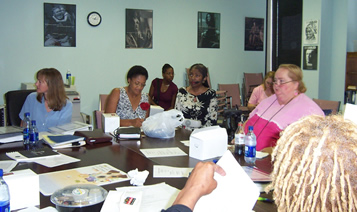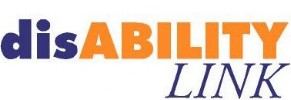The Georgia Peer Support Project is a project of the Georgia Department of Human Resources' Division of Mental Health, Developmental Disabilities and Addictive Diseases in partnership with disAbility Link and the Georgia
Governor’s Council on Developmental Disabilities.
The purpose of the Georgia Peer Support Project is to:
1) Train people with disabilities to become effective peer supporters to others
with disabilities so that they might lead self-directed and more autonomous,
satisfying lives, and
2) Help peer support be recognized as a skill that can be paid for by Medicaid etc.
In 2005, nearly 100 people across Georgia were trained and certified to provide the following skills and supports:
Listening / Communicating:
Peer Supporters are trained to let the individual receiving support lead the way –supporters help the person solve problems, and don’t do it for them.
Understanding Self Directed Care:
This skill set focuses on the consumer’s circle of support and self determination. Participants receive training on how to direct their own supports.
Helping People Find Community Services:
Here, participants learn about all the resources that are available to assist people with disabilities. They also learn to network with each other to identify services they may not know about, in an effort to best serve the consumer.
Helping People with Employment Issues:
Finding employment is a big issue for consumers, and peer supporters are trained to help them learn interview skills, find job resources, keep their benefits and more.
Developing Relationships:
Peer supporters learn how to help people with disabilities meet new friends and learn the characteristics of forming relationships.
Knowing When to Refer or Dealing with a Crisis:
Peer supporters know the signs of abuse, depression and suicide and know when to seek additional help for their client.
Project Contributers
 They include: Andreena Patton, Bernard Baker, Cheryl Laurendeau, Darlene
Coggins, Hilary Elliot, Jerilyn Leverett, Minna Hong, Rocky Rothrock,
Stacey Gardenhire- Hull, Valencia Thomas, Glen Friedman and Kate Gainer.
Vici Decker of The Institute on Human Development and Disability, University
of Georgia, was also on the original curriculum committee.
They include: Andreena Patton, Bernard Baker, Cheryl Laurendeau, Darlene
Coggins, Hilary Elliot, Jerilyn Leverett, Minna Hong, Rocky Rothrock,
Stacey Gardenhire- Hull, Valencia Thomas, Glen Friedman and Kate Gainer.
Vici Decker of The Institute on Human Development and Disability, University
of Georgia, was also on the original curriculum committee. Curriculum Coordinator: Linda Kendall-Fields
Writers: Hal L. Millard and Linda Kendall-Fields
Facilitators: Andreena Patton, Cheryl Laurendeau, Hilary Elliot, and Margo Waters
DHR Grant Representative: Valerie Vindici
Peer Support Training Coordinator: Linda Pogue
Governor’s Council on Developmental Disabilities: Danielle Doughman, Beth Spinning
The Georgia Peer Support Project training curriculum was developed under grant CFDA 93.779 from the U.S. Department of Health and Human Services, Centers for Medicare and Medicaid Services. However, the contents do not necessarily represent the policy of the U.S. Department of Health and Human Services, and you should not assume endorsement by the Federal government.

